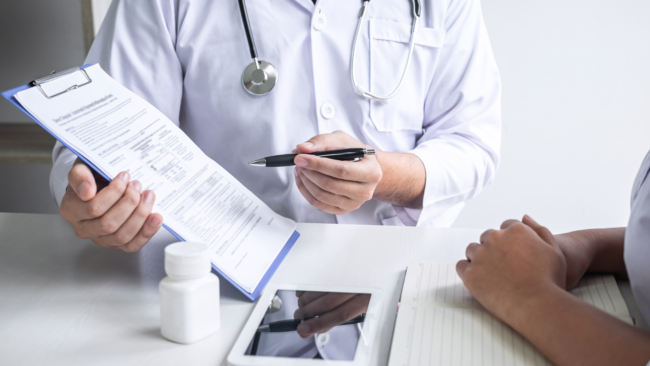Pre-clinical Research Step in the Drug Development Process (FDA) Testing before human subject clinical research, Good Laboratory Practice
Clinical Research Step in the Drug Development Process (FDA)
Definition of Human Subjects Research (NIH) Am I doing human subjects research?
Guiding Principles for Ethical Research (NIH)
Institutional Review Boards and Protection of Human Subjects in Clinical Trials (FDA) Information governing human subject protection and conduct of clinical trials
Institutional Review Boards (Frequently Asked Questions)
CDER - Center for Drug Evaluation and Research (FDA)CDER - Center for Drug Evaluation and Research (FDA) Oversight for prescription drugs, generics, biosimilars, and over-the-counter drugs
CBER – Center for Biologics Evaluation and Research (FDA) Oversight for biological products
Routine Costs in Clinical Trials (CMS) Medicare coverage of qualifying clinical trial costs
Regulatory Resources - Drugs (NIH) Information and case studies describing FDA regulation of small molecule and biologically derived therapeutics

A General Overview of Medical Product Clinical Investigations
Before pharmaceutical or biologic products become available to the public, clinical studies must be conducted to ensure their safety and efficacy. These studies, also known as trials, involve human participants. The medical product development process typically includes four main types of studies: Phase I, II, III, and IV. The selection of the appropriate study type depends on factors such as the stage of development, the type of marketing application, as well as the complexity of the product and the risks they pose to consumers.
Considerations for Drug Substances/Generic Drugs Clinical Trials
- Phases I and II are typically initiated following Investigational New Drug Application (IND) approval.
- Phase III studies play an important role in supporting New Drug Applications (NDAs) and Abbreviated New Drug Applications (ANDAs) in order to market these therapeutics.
- Marketing approval studies for generic products must demonstrate bioavailability or bioequivalence to the reference drug, often a brand-name drug. These studies can include animal research or clinical trials, but they are not always required.
Considerations for Biologics/Biosimilars Clinical Trials
- In addition to requiring clinical trial data to support Biologics License Applications (BLAs), the FDA also requires information about the manufacturing process of biological products to demonstrate purity and potency.
- Clinical trials for biosimilars may be conducted after the completion of analytical and animal studies to further address any clinically meaningful differences between the proposed biosimilar and reference biologic i.e., investigating pharmacodynamics and pharmacokinetics of the biosimilar in study participants.
- The FDA permits risky gene therapy trials involving the pediatric population, provided that the IRB determines the study can be conducted under the criteria outlined in 21 CFR 50, Subpart D – Additional Safeguards for Children in Clinical Investigations.
Resources
Click each title below to reveal resources.
Regulatory Toolbox – Investigational New Drugs or Biologics (NIH) What’s an IND? Is this study IND exempt?
Investigational New Drug (IND) Application
IND Contacts (FDA)
Expanded Access – Information for Physicians Compassionate Use
Emergency Use Authorization
Clinical Trials Guidance Documents (FDA) Search for FDA guidance documents
Informed Consent
Key Information and Facilitating Understanding in Informed Consent Guidance for Sponsors, Investigators, and Institutional Review Boards (FDA)
Data Retention When Subjects Withdraw from FDA-Regulated Clinical Trials
Decentralized Clinical Trials for Drugs, Biological Products, and Devices
Use of Data Monitoring Committees in Clinical Trials
Human Gene Therapy for Rare Diseases
Protocol Templates for Clinical Trials
Clinical Research Study Investigator’s Toolbox
Forms and Logs for Clinical Study Start-Up and Conduct An A to Z repository of forms, logs, and checklists for participant charts, regulatory binders, investigational products, etc.
Citi (Collaborative Institutional Training Initiative) Program (GCP, HIPPA, and Human Subjects training)
Clinical Trial Quality Training Series (Monitoring, Auditing, Site Preparedness for FDA Inspection)
eMPACT Translational Workforce Development Course Catalog Continuing education credits
Society of Clinical Research Associates (SOCRA) Clinical Research Professional Certification
Association of Clinical Research Professionals (ACRP) Multiple certification types depending on role
Clinicaltrials.gov Online database of clinical research studies in the US and 200 other countries
EudraCT European Union Drug Regulating Authorities Clinical Trial Database
International Clinical Trials Registry Platform (ICTRP) International Clinical Trials Registry Platform
IRB Forms and Templates
Human Research Protection Program (HRPP)
iStar FAQ
Post [IRB] Approval Monitoring (PAM) USC Self-Assessment Tool to verify research is conducted as approved by IRB
Guide to Clinical Research at USC (SC CTSI)
USC Clinical Studies Directory (SC CTSI) Recruitment tool
Tools and Services for Conducting Research (SC CTSI)
Go to Resources for this page